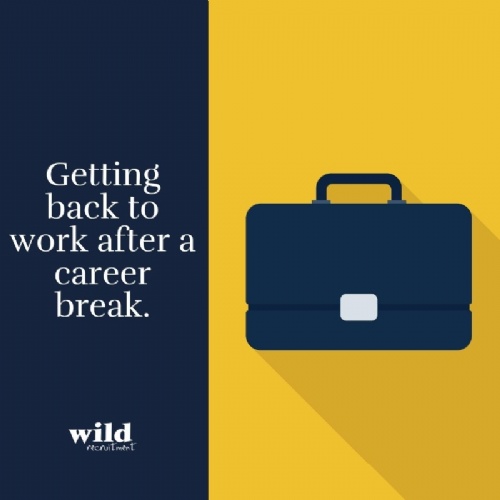Getting back to work after COVID or a career break

As a job seeker, you are in high demand right now. You’ve most likely heard about the current candidate shortage across several sectors in the UK, which means it’s never been a better time for you to land a brilliant new role that ticks your boxes.
If you are someone who has experienced some time away from work, you may be feeling anxious or hesitant about returning. But we're here to advise on the best ways you can prepare yourself to ensure you succeed.
1. EXPLAINING THE GAP.
In previous times, career gaps were a bit of a taboo and were discouraged unless necessary. Today, career gaps are expected and employers’ attitudes towards them are changing. Particularly as COVID has forced people off of work involuntarily.
But don’t assume your potential employer will just skim over this in your interview and have an explanation prepared. If you have been out of work because you’ve been made redundant, expect to summarise a bit of what you’ve done with your time out of work.
Most employers are very understanding of how the pandemic has affected everyone’s mental health, family life, financial situations, relationships, career goals and life plans. It’s no secret that it’s thrown almost everyone off course. So don’t fret if you haven’t penned a novel, become fluent in a new language or completed a degree!
It’s highly unlikely that you didn't do anything in your time off. Perhaps you’ve assisted a neighbour or family member, did some online courses, found a new hobby, worked on a skill or did some research into a new industry. Either way, ensure you have some positive talking points about your break, and end it with how you’re prepared to get back into work and make a difference in the organisation you’re interviewing with.
2. RESEARCH.
A lot has likely changed since you left. So whether you’re heading back into the same industry or you’re looking to go into something new, doing your research is vital. Certain industries are suffering from severe staff shortages but it’s also important to understand which roles will be in demand over the longer term.
Your interviewer may ask you about practices, trends or changes within the industry to determine how serious you are about the role you’re applying for, so make sure you’re clued up on recent events and standard practice.
Some of the ways you can keep on top of your industry are by following blogs and social media pages, registering for Google alerts and signing up for email newsletters.
| Find out how you can work on your employability from home. |
3. HAVE A PLAN, BUT BE OPEN-MINDED.
After a prolonged time away from work, you may have had thoughts or doubts about your career path, and your priorities may have changed.
It’s important to have an idea of what you want out of your work life, and if you don’t structure your job search accordingly then you may end up getting frustrated with the results.
However, it is beneficial to be slightly open-minded when being invited to interviews. It’s easy to talk yourself out of an opportunity because you’re anxious, you feel like the job is beyond your skill set, there are some aspects of the job spec you’re unsure on or they haven’t mentioned some of the benefits you’re looking for.
Remember, it is just an interview. You are under no obligation and every interview is a learning experience. Many employers will adjust their terms for the right candidate, and you might be pleasantly surprised by what the role can offer you when you attend. Particularly if there appears to be a great company culture and career progression routes.
Some things are difficult to gauge from a job spec, so if it ticks most of your boxes, it’s worth a shot!
4. REMIND YOURSELF OF THE THINGS YOU ENJOYED ABOUT WORK.
Build a mental picture of the things that made your workdays enjoyable.
Conversations with colleagues, team social events, training and development days, the Christmas treats, rounds of praise from your managers, seeing different faces and places every day, lunchtime catch-ups, hitting goals and achieving targets.
And if it helps, try to look to the long-term and think about where you’d want to be in 5, 10, 15 years’ time. This will motivate you and give you something to work towards.
5. UPDATE YOUR CV.
We know. You hate updating your CV. But it’s recommended that you refresh your CV once or twice a year if you want to have the edge over other candidates.
Ensure all of your information is current and correct. Make sure it’s in an ordered and professional manner and that it includes all of your achievements and successes.
| Read our complete guide on making your CV stand out. |
6. GET SUPPORT AND ADVICE FROM A RECRUITMENT AGENT.
Recruitment agencies can offer exceptional support throughout your career. Not only will they get to know your personality, skills and aspirations to suitably match you to a role, but they can also offer CV advice, interview support and career guidance.
Ultimately, recruitment agents will act as an intermediary between you and their clients (or potential employers). So as a completely free service, recruitment agencies are certainly worth utilising in your job search.
So… Are you ready to find a role worth leaving home for?

